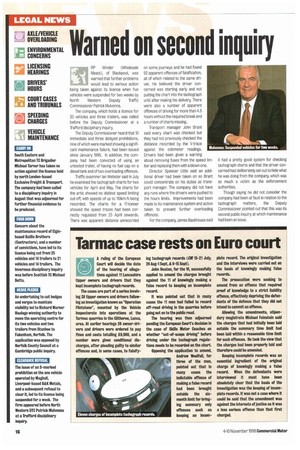Tarmac case rests on Euro court
Page 18

If you've noticed an error in this article please click here to report it so we can fix it.
A ruling of the European Court will decide the date of the hearing of allegations against 11 Lancashire
tipper owners and drivers that they kept incomplete tachograph records.
The cases are part of a series Involving 58 tipper owners and drivers following an investigation known as "Operation Ffintstone", mounted by the Vehicle Inspectorate into operations at the Tarmac quarries in the Clitheroe. Lanes, area. At earlier hearings 26 owner-drivers and drivers were ordered to pay fines and costs totalling £9,960, and a number were given conditional discharges, after pleading guilty to similar offences and, In some cases, to falsify
ing tachograph records (CM 15-21 July, 26 Aug-1 Sept, & 9-15 Sept).
John Heaton, for the VI, successfully applied to amend the charges brought against the 11 of knowingly making a false record to keeping an incomplete record.
It was pointed out that in many cases the 11 men had failed to record off-road driving in the quarries before going out on to the public road.
The hearing was then adjourned pending the European Court's decision in the case of Skills Motor Coaches on whether "out-of-scope driving" before driving under the tachograph regulations needs to be recorded on the chart. application to amend, Andrew Woolfall, for three of the men, pointed out that in many cases the Indictable offence of making a false record had been brought outside the sixmonth limit for bringing summary only offences such as keeping an Incoin
plete record. The original investigation and the interviews were carried out on the basis of knowingly making false records.
The prosecution were seeking to amend from an offence that required proof of knowledge to a strict liability offence, effectively depriving the defendants of the defence that they did not Intend to commit an offence.
Allowing the amendments, stipendary magistrate Michael Feinstein said the charges that had initially been laid outside the summary time limit had been laid within a reasonable time limit for such offences. He took the view that the charges had been properly laid and therefore could be amended, Keeping incomplete records was an essential ingredient of the original charge of knowingly making a false record. When the defendants were interviewed it must have been absolutely clear that the basis of the investigation was the keeping of incomplete records. it was not a case where it could be said that the amendment was against the interests of justice as it was a less serious offence than that first charged.








































































































































